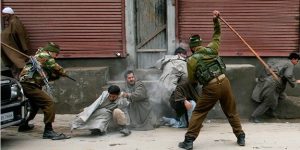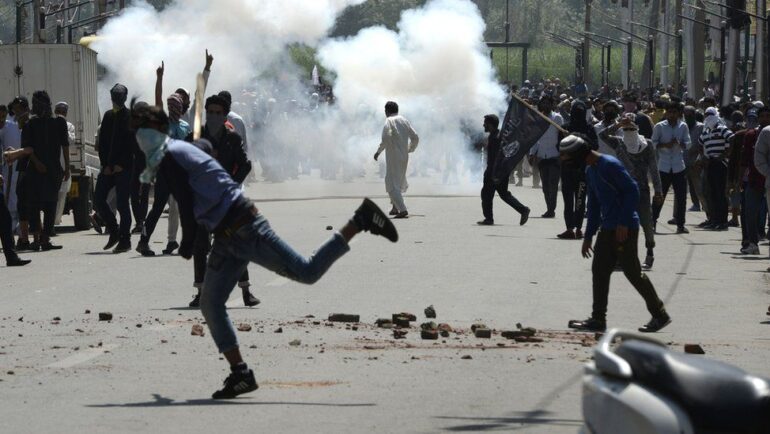Newspaper Article 25/04/2014
History of India-Pakistan relations in the context of Kashmir dispute is witness that India has been pursuing a strategy of delaying the resolution of Kashmir dispute and taking steps to ultimately making Kashmir as its integral part. India has posed hurdles to implementation of UNSC resolutions on Kashmir issue (1948) asking for simultaneous withdrawal of troops from Kashmir (as per recommendations of the UN Arbitrator on Kashmir, General Andrew McNaughton), and holding a plebiscite there to ascertain the will of the people of Jammu and Kashmir whether they wanted to join Pakistan or India. The UN arbitrators had put forth 11 proposals for demilitarization of Kashmir, as a prelude to holding a plebiscite, which were accepted by Pakistan but India rejected all proposals. In this context even Jawaharlal Nehru, the first Prime Minister Of India, had reneged on his promise, made to the people of Kashmir in 1947, that the final decision of accession of Jammu and Kashmir to India will be done after ascertaining will of the people of the state through a plebiscite. Later, in Simla accord signed by India and Pakistan in 1972, it was reiterated by both countries that their mutual relations will be conducted in accordance with the UN Charter and they will resolve all outstanding disputes including Kashmir issue peacefully through mutual dialogue. In accordance with the spirit of this Agreement, in past 42 years, while Pakistan has tried its best to discuss Kashmir issue with India during bilateral talks, India has evaded discussion on this issue for almost half a century. In the composite dialogue initiated in 2003, where both countries had agreed to conduct dialogue on all issues simultaneously India has so far evaded any discussion on Kashmir.
Since 1948, in utter violation of UNSC resolutions, successive Indian governments have taken various unilateral steps to make the state as an integral part of India without ascertaining will of the people of Jammu and Kashmir through a plebiscite. In 1951 India had held first post-independence elections in the state of Jammu and Kashmir. After the elections, the then Indian government had stated that the election had made the UNSC sought referendum unnecessary. Disagreeing with this statement of Indian government, the UN had passed a resolution to the effect that such elections did not substitute a plebiscite, because a plebiscite offered the option of choosing between India and Pakistan. In 1953, Indian authorities dismissed and arrested Prime Minister of the state of Indian held Kashmir (IHK), Sheikh Abdullah, leader of the governing National Conference, after he took a pro-referendum stance and delayed formal accession to India. Later, Indian government coerced the new Jammu and Kashmir government and got the accession to India ratified in violation of the earlier mentioned UN resolution. In 1957, the constitution of IHK, made on India’s terms by this Indian installed state government, defined the state as part of India.
In 1987 the highly rigged state elections in IHK gave impetus to already simmering freedom movement with the support of almost all political parties of the state represented by all factions of All Parties Hurriyat Conference (APHC). Since then freedom movement in IHK, seeking right of self determination, continues and people of Jammu and Kashmir remain completely alienated from India. With its more than 600,000 troops deployed in the state, India is busy in crushing the freedom struggle using the brutal force which has killed about 100,000 Kashmiris since 1989 and carried out wide ranging human rights violations of immense proportion. One major proof of such ferocious atrocities committed by the Indian security forces is a report of the Indian State Human Rights Commission (SHRC) which confirmed presence of more than 2,000 unidentified bodies in unmarked graves near the Line of Control. Activists say many may be people who disappeared after being arrested by security forces. By killing and physically torturing the people of Jammu and Kashmir since 1989, India is struggling to coerce them to drop their demand for self determination and live permanently under its rule by accepting that Jammu and Kashmir was an integral part of India. Also, to undermining Pakistani efforts of highlighting Kashmir dispute, on February 22, 1994, both houses of Indian Parliament adopted a resolution emphasizing that Jammu and Kashmir was an integral part of India, and that Pakistan must vacate parts of the state under its occupation. To end Pakistan’s political, moral and diplomatic support to the Kashmiris, India is endeavouring to coerce Pakistan by destabilizing Balochistan, using Afghan soil. These acts of successive Indian governments clearly indicate India’s malicious game plan of ultimately making the state of Jammu and Kashmir as its part.
While Pakistan has been struggling to win over support of international community and major world powers in favour of influencing India to resolve Kashmir dispute in accordance with the UN resolutions and the will of the people of Kashmir, India has been making consistent efforts to dilute that international support. In this regard India particularly exploited war on terror being fought in Afghanistan to brand Kashmir freedom struggle as terrorism. Somehow western countries were so involved in the war on terror that they became prey to the Indian engineered propaganda and since last about twelve years western support in favour of Kashmir dispute has remained diluted. In this context signing of strategic partnership and nuclear deal between the US and India further weakened the support of the US and EU to the people of Jammu and Kashmir. This is because in view of their strategic and commercial interests perceived to be linked with India, they feel constrained to pressurize that country for an early and just solution of the dispute. Because of this strategic advantage India has become more hegemonic and encouraged relegate discussion on the Kashmir issue. In view of this Indian position it has also rejected Pakistani proposals of foreign mediation.
The above discussion indicates that India is conducting its relations with Pakistan based on the realist theory of power politics where states struggle to increase their power and influence at regional and international levels to dominate their adversaries. In this context India is enhancing and using its politico-diplomatic position and military strength to subdue Kashmiris and coerce Pakistan to give up their principled positions on Kashmir and accept IHK as an integral part of India. In future India is likely to further harden its position on Kashmir.
In the light of above discussed scenario and India’s Kashmir strategy, Pakistan needs to revisit its Kashmir policy and realign its domestic, foreign and defence policies accordingly to succeed in failing Indian designs on Kashmir and creating favourable domestic and international environment to make India willing to resolve the Kashmir dispute according to the wishes of the people of Kashmir.
Carried by The Pakistan Observer, March30, 2014.
Disclaimer: Views expressed are of the writer and are not necessarily reflective of IPRI policy.


